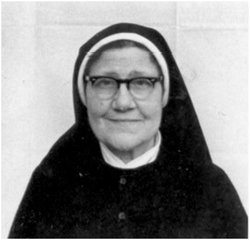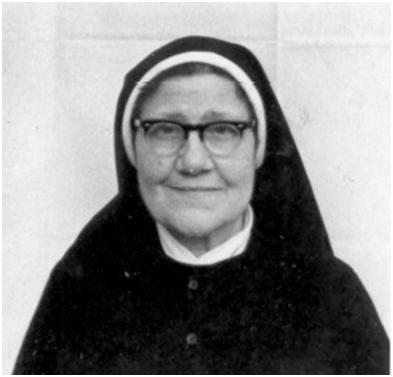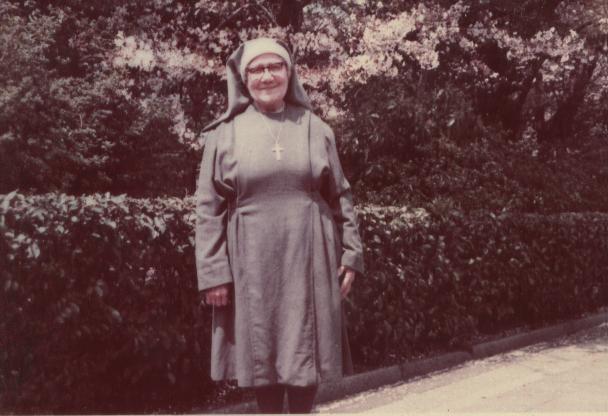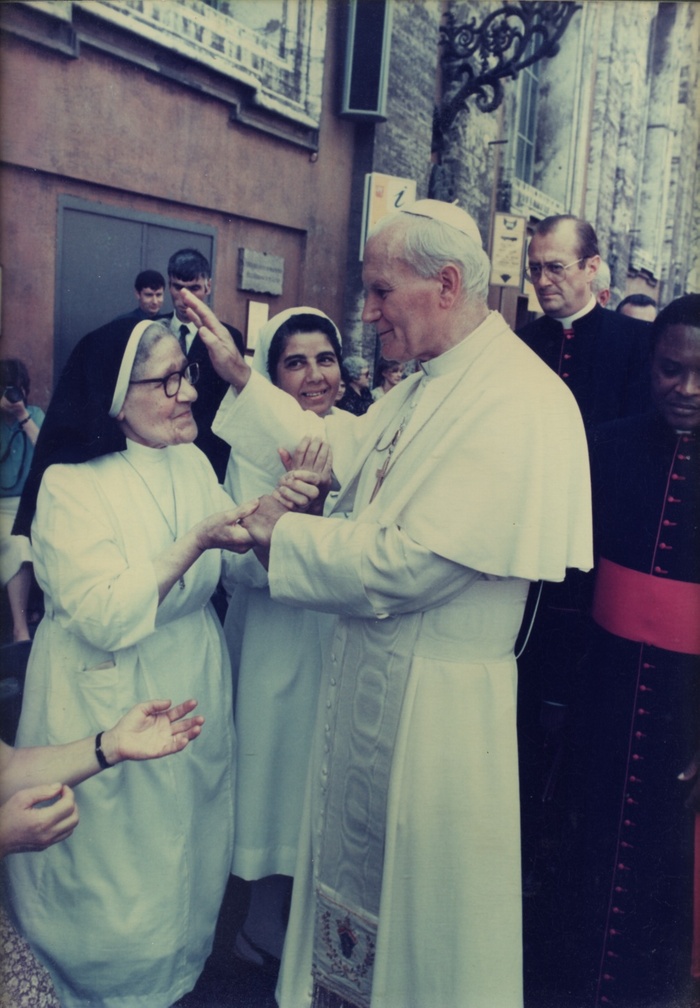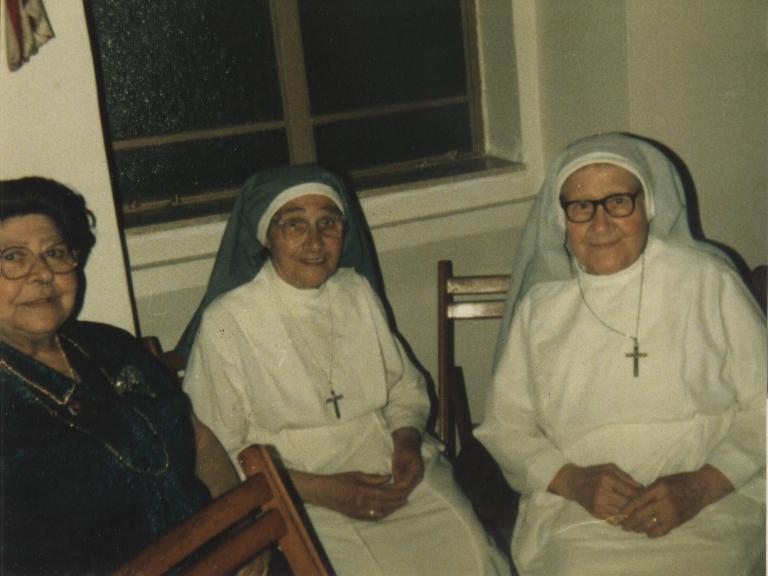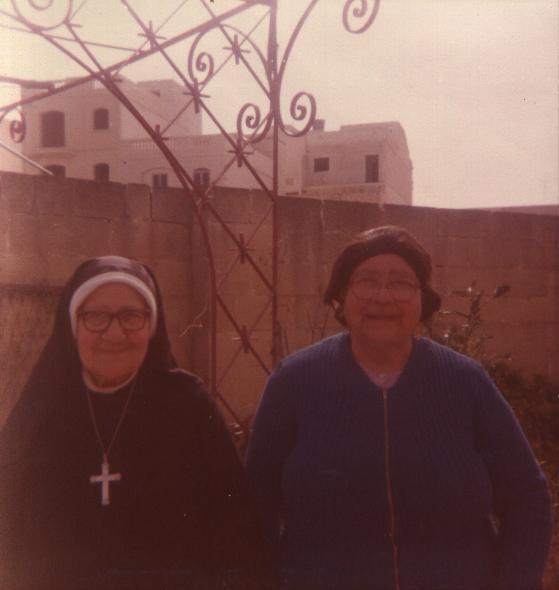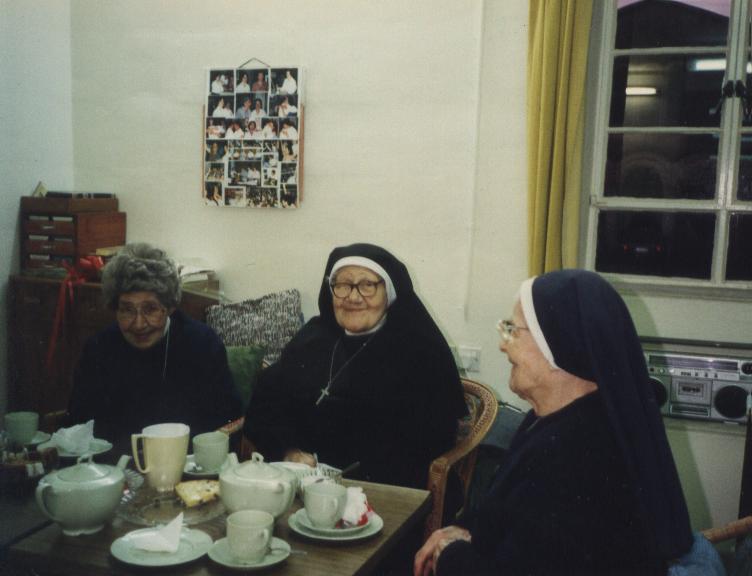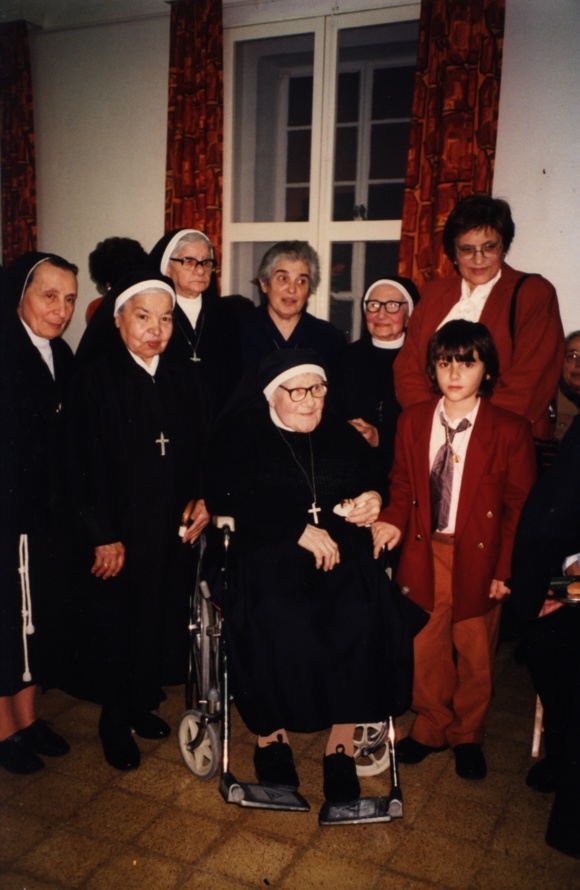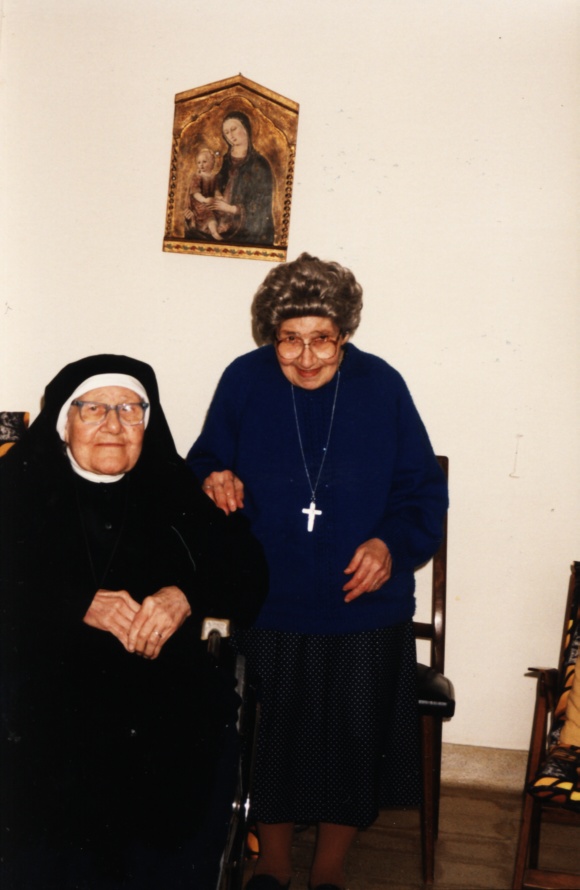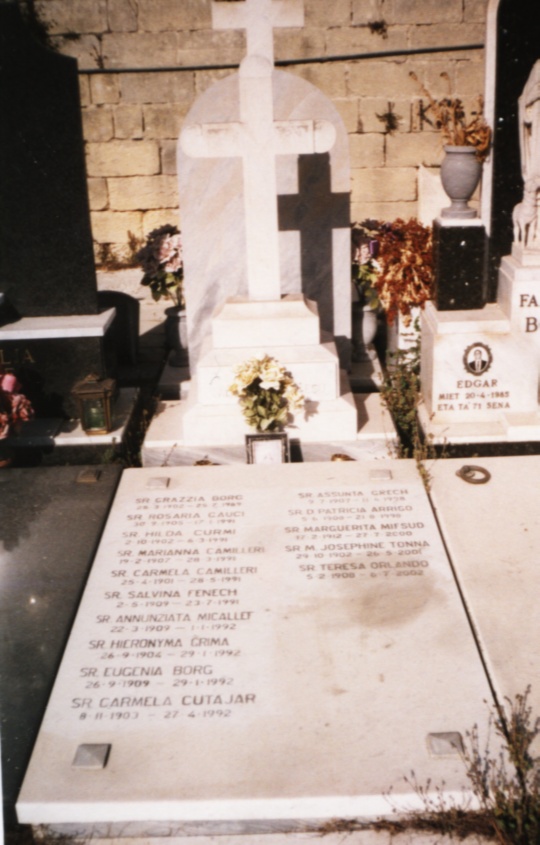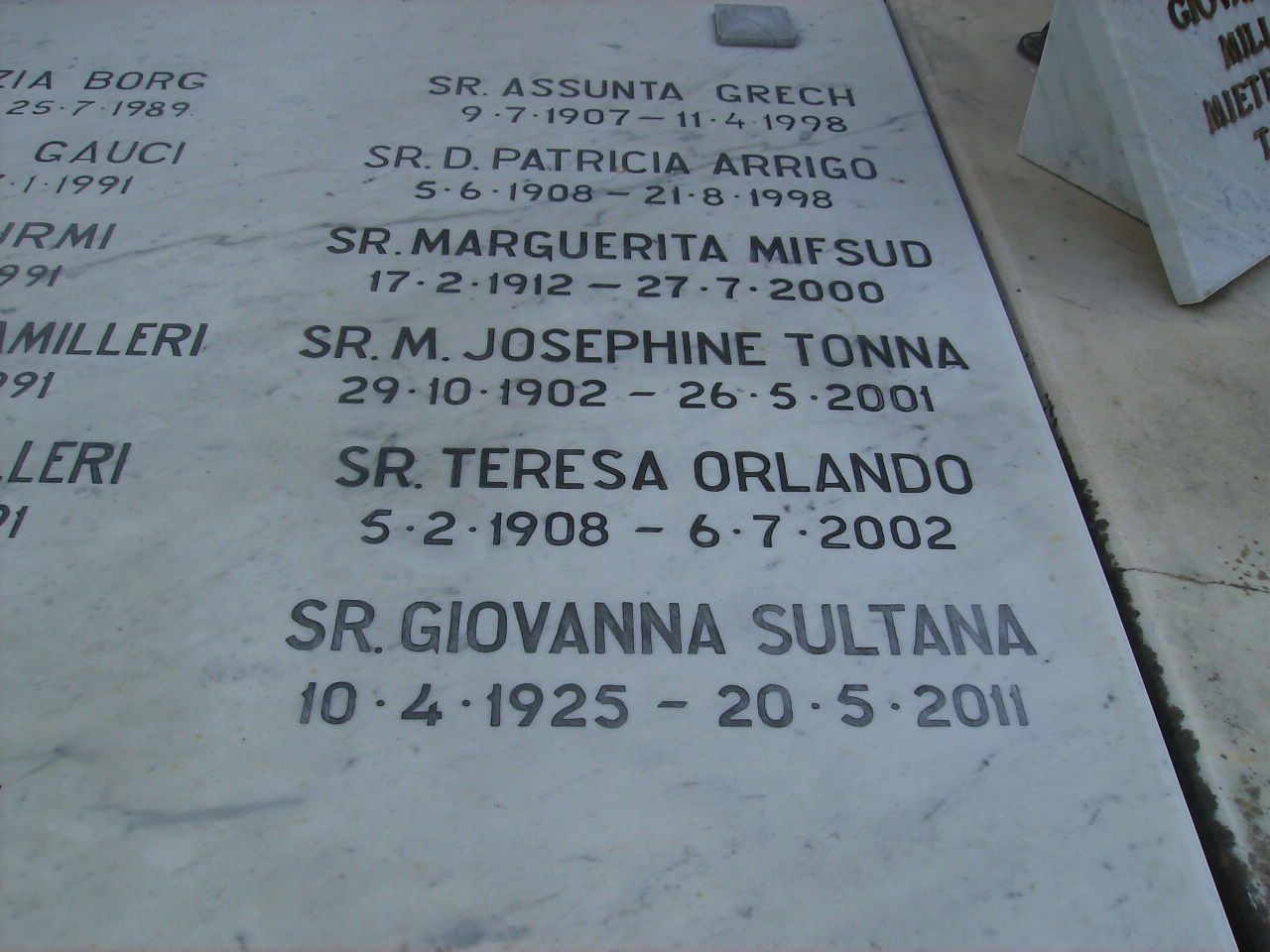Teresa joined the Society at their Convent in St. Julian's, Malta, on December 8, 1926, took her Temporary Vows on July 26, 1929, and made her Religious Profession in Newcastle upon Tyne, England, on March 25, 1935. Following her Profession she was appointed as a 3rd Cook, and later promoted to 2nd, while still in England, in Fenham, Newcastle. She received at first, Obedience to move to China, but became so sea sick on the ship which led the journey from the United States, that her Mother Superior changed her Obedience to Tokyo, Japan. Arriving there in September 1935, she was named 1st Cook, in charge of the dispense. In August 1938, she went to Obayashi, from where she was interned in three different Concentration Camps during the Second World War. In 1947, after the war, she returned to Tokyo, where she was assigned to the University College, serving as Sacristan and welcoming visitors. Named 1st Cook again in 1952, the following year she was assigned to the International School, and in 1954, to the local Community. Successively, Teresa returned to Obayashi where she worked in the School Infirmary and did the housework. On March 28, 1956, she returned to Toyko to work in the College and the International School.
For two years, starting from 1960, she helped in the Kindergarden and the dispense, until she moved to Seoul, South Korea, where she served as a cook for four years. Life in Korea was extremely difficult to lead. Food was scarce and poverty was abundant. As a result, her health deteriorated rapidly. Gladly, her stay in Korea was a short one, as she was assigned by Superiors as cook in Susono, back in Japan. She returned to her native Malta after 40 years of missionary life in 1974, forming part of the Society Houses of St. Julian's, Pieta, Fgura, and Tal-Virtù from 1987 until her death.
Teresa led such an active life, that various interesting anecdotes related to her seem to fall out of a classic romance book or a children's adventure story. However, she only consented to write down her memoirs only "in obedience", the first phrase one reads in her two volumes of autobiographical records. A humble, talented woman, her never-failing beautiful smile was the greatest welcome one could ever receive. Window shopping and greeting anyone who would happen to pass by her were natural to her. In this manner, she befriended hundreds of people. Letters used to reach her from all over the world. Children were particularly dear to her. If letters never stopped reaching her, so did visits, especially in her retirement, as now grown up Japanese and Korean she once cared for as children, would travel so long to pay her a visit. Many remembered how she would spare her food in Korea to give it to them. Her ever present rosy red cheeks and joyful, warm smile remained always present in the remembrances of all those who ever met her. Apart from cooking, lacemaking and knitting were two of her best capabalities.
Teresa was however above all, a deeply spiritual woman. All she left in her room following her death were heaps of notes, booklets, papers, and notes - a sort of a long, never ending spiritual diary which she constantly kept writing across her long life, on every piece of paper she could find when some new phrase would cross her mind. She had however one particular temptation that she could not resist: her love for sweets! A small bag of sweets from anyone paying her a visit would be the best and most appreciated present she could receive!
Various interesting anecdotes are related to her. A particular "love" story, I would like to share here. Teresa was a very good looking woman. Reflection of her beauty was still present in her old age, so one can only imagine her looks in her teenage years. As she used to help her mother in her grocery store, staying there for long hours as her mother grew older and sick, her beauty caught the eye of a young man called Johnny. This young lad began visiting the shop over and over again with the excuse of buying cigarettes. His habit seemed to grow older by the minute, for his presence at the shop became more and more frequent. His compliments towards her lacemaking also grew deeper. Teresa knew that her sisters were much more talented than she was and that he did not smoke as many cigarettes as he bought, but enjoyed his company. They used to go on to the roof together and in the evenings, she would go and hear some songs on his gramaphone. But her deep desire to enter religion left her with a question. She did not know what was best to choose for her. Very close to her father since childhood, she spoke with him, who made her understands that marriage life was a Sacrament and there was nothing wrong with it, but if she felt it was not adapted for her, than she would not choose it. Her Confessor told her to do a Novena to the Sacred Heart. At the end, she decided to enter Religion. She found Johnny as told him of her decision. He nodded and said nothing, but understood her decision.
Some 50 years later, back in Malta, Sister Teresa was walking when she was stopped by an elderly, smart looking gentleman. "Sr. Teresa, I presume?", the gentleman said. "You might not remember me, for so many years have passed. My name is Johnny. I used to come and see you in your shop to buy cigarettes. Now that so many years have passed, I want to tell you that I understood your decision, though it was hard for me, as you have loved someone much more higher and stronger than I am. But I want to tell you, that because of you, I never married. I never stopped loving you!"
In her memoirs, she writes about her vocation: "When I was about 15, I wanted to become a full member of the MUSEUM, a soċja, but my mother would not hear of it. She said she would not object to my becoming a nun, but not a MUSEUM member. I spoke to the priest, and said to wait. Then, I became attracted to an order of cloistered nuns and I was accepted by them. So I started getting everything ready to enter, and for two weeks I was busy getting my things. Then my father said to me, "I am very happy about you becoming a nun, but not about joining the congregation. That is not the right one for you". I replied, "But I have been getting everything ready for two whole weeks, why do you tell me that now?". Then my mother said, "As everything is ready, why not let her go? If that is not the place for her, God will make it clear". So we went to the Convent and my father told to Superior what he had been thinking and she said to me, "Your father is inspired by God on behalf of all the family. You should do what he says. God will show you the way." So I returned home.
My father said that at 15, I was still vey young and God will open the door for me in due time. A year later some young girls whom I knew from Zejtun entered the Society of the Sacred Heart. I went to see them one day and as I entered through the front door, there was this big statue of the Sacred Heart right there, in the middle of the entrance hall. I felt the Lord speaking to me and say, "This is where I want you".
I spoke to Mother Pulé, the Superior. She said that at 16 I was still too young and I that I had to wait until I was 17, before being able to enter. She also advised me to ahve an operation to have my tonsils out before then, as I was suffering from them. So I had my tonsils removed and waited till I was 18, then entered".
Another anecdote of hers, reflects her ardent desire to obey to the full the rules of Religious life, notwithstanding the deep sacrifices such rules sometimes impose. "One day my father came to work at the Convent. Of course I did not know, but while I was hanging the clothes, my father saw me and started calling me. I pretended not to hear and so he kept on calling. I hurried in and my heart was almost broken as I pretended not to hear him. But I felt at any cause I must be faithful. Later on during the day, the Mother Superior called me and told me: "Do you know that your father is working here?" And so I told her what had happened that morning. And she said: "As you where faithful you can go and talk to him". Afterwards I knew that she was looking from her window and had seen everything."
The Second World War saw her internment in three different Camps in Japan, together with her fellow Sisters and various other Catholic and Protestant Priests and Nuns who served in Japan. The Nuns tried to lead a regular life. Many studied French, Japanese and Chinese, in order to pass time, while their Mother Superior once also organized an eight day retreat during their carceration. Life in the camps was somewhat difficult. The Nuns endured several humiliations from the guards. In her memoirs she recalls the way they were treated by the guards, who used to mock them continuosly mainly due to their Religious garb.
The dropping of the atom bombs did not spare the Sisters. Most of them suffered numerous complications due to radiation exposure. Sr. Teresa was eventually diagnosed with brain tumor. Some weeks after undergoing surgery, her Superior remarked the fact that her veil was continously dirty and asked her if she was washing it. Teresa replied that after surgery she kept loosing blood from time to time and although she washed her veil daily, continuos fluid leaks made her veil look unclean all the time. Choosing to observe Silence, she did not thus inform her Superiors. A check up led to another surgery. In the first one, a small patch was left in her head and a severe inflammation had taken place. In 1975, shortly after her return to Malta, she was recovered for five weeks at St. Luke's Hospital as a result of a severe infection, again the result of radioactive effects.
Teresa passed peacefully away in her sleep at the Sacred Heart's Tal-Virtù House, limits of Rabat, Malta, at the venerable age of 94, on July 6, 2002, at 11.30 pm. Her Funeral Mass was celebrated at the Seminary Chapel, Tal-Virtù, on Monday, July 8, at 2.30 pm. She now rests at the Sta. Maria Addolorata Cemetery in one of the Society's Vaults.
Teresa joined the Society at their Convent in St. Julian's, Malta, on December 8, 1926, took her Temporary Vows on July 26, 1929, and made her Religious Profession in Newcastle upon Tyne, England, on March 25, 1935. Following her Profession she was appointed as a 3rd Cook, and later promoted to 2nd, while still in England, in Fenham, Newcastle. She received at first, Obedience to move to China, but became so sea sick on the ship which led the journey from the United States, that her Mother Superior changed her Obedience to Tokyo, Japan. Arriving there in September 1935, she was named 1st Cook, in charge of the dispense. In August 1938, she went to Obayashi, from where she was interned in three different Concentration Camps during the Second World War. In 1947, after the war, she returned to Tokyo, where she was assigned to the University College, serving as Sacristan and welcoming visitors. Named 1st Cook again in 1952, the following year she was assigned to the International School, and in 1954, to the local Community. Successively, Teresa returned to Obayashi where she worked in the School Infirmary and did the housework. On March 28, 1956, she returned to Toyko to work in the College and the International School.
For two years, starting from 1960, she helped in the Kindergarden and the dispense, until she moved to Seoul, South Korea, where she served as a cook for four years. Life in Korea was extremely difficult to lead. Food was scarce and poverty was abundant. As a result, her health deteriorated rapidly. Gladly, her stay in Korea was a short one, as she was assigned by Superiors as cook in Susono, back in Japan. She returned to her native Malta after 40 years of missionary life in 1974, forming part of the Society Houses of St. Julian's, Pieta, Fgura, and Tal-Virtù from 1987 until her death.
Teresa led such an active life, that various interesting anecdotes related to her seem to fall out of a classic romance book or a children's adventure story. However, she only consented to write down her memoirs only "in obedience", the first phrase one reads in her two volumes of autobiographical records. A humble, talented woman, her never-failing beautiful smile was the greatest welcome one could ever receive. Window shopping and greeting anyone who would happen to pass by her were natural to her. In this manner, she befriended hundreds of people. Letters used to reach her from all over the world. Children were particularly dear to her. If letters never stopped reaching her, so did visits, especially in her retirement, as now grown up Japanese and Korean she once cared for as children, would travel so long to pay her a visit. Many remembered how she would spare her food in Korea to give it to them. Her ever present rosy red cheeks and joyful, warm smile remained always present in the remembrances of all those who ever met her. Apart from cooking, lacemaking and knitting were two of her best capabalities.
Teresa was however above all, a deeply spiritual woman. All she left in her room following her death were heaps of notes, booklets, papers, and notes - a sort of a long, never ending spiritual diary which she constantly kept writing across her long life, on every piece of paper she could find when some new phrase would cross her mind. She had however one particular temptation that she could not resist: her love for sweets! A small bag of sweets from anyone paying her a visit would be the best and most appreciated present she could receive!
Various interesting anecdotes are related to her. A particular "love" story, I would like to share here. Teresa was a very good looking woman. Reflection of her beauty was still present in her old age, so one can only imagine her looks in her teenage years. As she used to help her mother in her grocery store, staying there for long hours as her mother grew older and sick, her beauty caught the eye of a young man called Johnny. This young lad began visiting the shop over and over again with the excuse of buying cigarettes. His habit seemed to grow older by the minute, for his presence at the shop became more and more frequent. His compliments towards her lacemaking also grew deeper. Teresa knew that her sisters were much more talented than she was and that he did not smoke as many cigarettes as he bought, but enjoyed his company. They used to go on to the roof together and in the evenings, she would go and hear some songs on his gramaphone. But her deep desire to enter religion left her with a question. She did not know what was best to choose for her. Very close to her father since childhood, she spoke with him, who made her understands that marriage life was a Sacrament and there was nothing wrong with it, but if she felt it was not adapted for her, than she would not choose it. Her Confessor told her to do a Novena to the Sacred Heart. At the end, she decided to enter Religion. She found Johnny as told him of her decision. He nodded and said nothing, but understood her decision.
Some 50 years later, back in Malta, Sister Teresa was walking when she was stopped by an elderly, smart looking gentleman. "Sr. Teresa, I presume?", the gentleman said. "You might not remember me, for so many years have passed. My name is Johnny. I used to come and see you in your shop to buy cigarettes. Now that so many years have passed, I want to tell you that I understood your decision, though it was hard for me, as you have loved someone much more higher and stronger than I am. But I want to tell you, that because of you, I never married. I never stopped loving you!"
In her memoirs, she writes about her vocation: "When I was about 15, I wanted to become a full member of the MUSEUM, a soċja, but my mother would not hear of it. She said she would not object to my becoming a nun, but not a MUSEUM member. I spoke to the priest, and said to wait. Then, I became attracted to an order of cloistered nuns and I was accepted by them. So I started getting everything ready to enter, and for two weeks I was busy getting my things. Then my father said to me, "I am very happy about you becoming a nun, but not about joining the congregation. That is not the right one for you". I replied, "But I have been getting everything ready for two whole weeks, why do you tell me that now?". Then my mother said, "As everything is ready, why not let her go? If that is not the place for her, God will make it clear". So we went to the Convent and my father told to Superior what he had been thinking and she said to me, "Your father is inspired by God on behalf of all the family. You should do what he says. God will show you the way." So I returned home.
My father said that at 15, I was still vey young and God will open the door for me in due time. A year later some young girls whom I knew from Zejtun entered the Society of the Sacred Heart. I went to see them one day and as I entered through the front door, there was this big statue of the Sacred Heart right there, in the middle of the entrance hall. I felt the Lord speaking to me and say, "This is where I want you".
I spoke to Mother Pulé, the Superior. She said that at 16 I was still too young and I that I had to wait until I was 17, before being able to enter. She also advised me to ahve an operation to have my tonsils out before then, as I was suffering from them. So I had my tonsils removed and waited till I was 18, then entered".
Another anecdote of hers, reflects her ardent desire to obey to the full the rules of Religious life, notwithstanding the deep sacrifices such rules sometimes impose. "One day my father came to work at the Convent. Of course I did not know, but while I was hanging the clothes, my father saw me and started calling me. I pretended not to hear and so he kept on calling. I hurried in and my heart was almost broken as I pretended not to hear him. But I felt at any cause I must be faithful. Later on during the day, the Mother Superior called me and told me: "Do you know that your father is working here?" And so I told her what had happened that morning. And she said: "As you where faithful you can go and talk to him". Afterwards I knew that she was looking from her window and had seen everything."
The Second World War saw her internment in three different Camps in Japan, together with her fellow Sisters and various other Catholic and Protestant Priests and Nuns who served in Japan. The Nuns tried to lead a regular life. Many studied French, Japanese and Chinese, in order to pass time, while their Mother Superior once also organized an eight day retreat during their carceration. Life in the camps was somewhat difficult. The Nuns endured several humiliations from the guards. In her memoirs she recalls the way they were treated by the guards, who used to mock them continuosly mainly due to their Religious garb.
The dropping of the atom bombs did not spare the Sisters. Most of them suffered numerous complications due to radiation exposure. Sr. Teresa was eventually diagnosed with brain tumor. Some weeks after undergoing surgery, her Superior remarked the fact that her veil was continously dirty and asked her if she was washing it. Teresa replied that after surgery she kept loosing blood from time to time and although she washed her veil daily, continuos fluid leaks made her veil look unclean all the time. Choosing to observe Silence, she did not thus inform her Superiors. A check up led to another surgery. In the first one, a small patch was left in her head and a severe inflammation had taken place. In 1975, shortly after her return to Malta, she was recovered for five weeks at St. Luke's Hospital as a result of a severe infection, again the result of radioactive effects.
Teresa passed peacefully away in her sleep at the Sacred Heart's Tal-Virtù House, limits of Rabat, Malta, at the venerable age of 94, on July 6, 2002, at 11.30 pm. Her Funeral Mass was celebrated at the Seminary Chapel, Tal-Virtù, on Monday, July 8, at 2.30 pm. She now rests at the Sta. Maria Addolorata Cemetery in one of the Society's Vaults.
